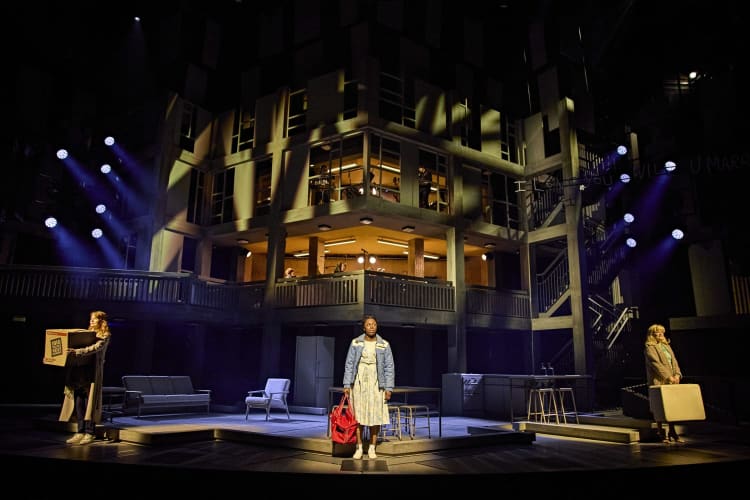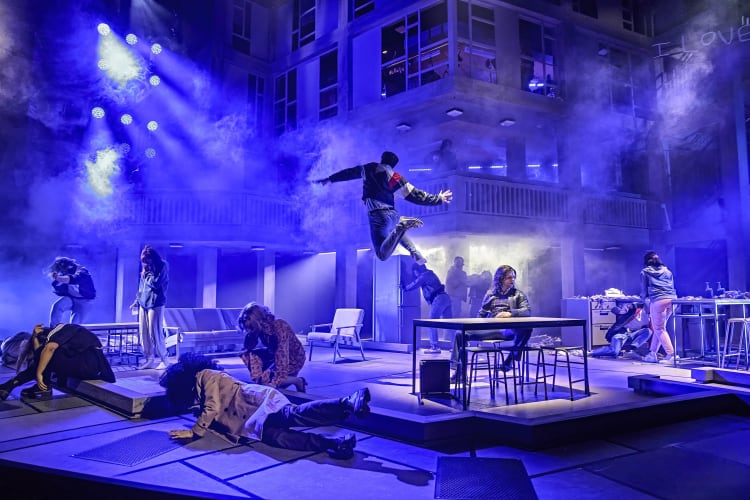The set of Standing at the Sky’s Edge hits you when taking your seat—the brutalist walkways of Sheffield's Park Hill estate and high-rise flats contain the band across two levels that glow from within.
Iconic digital clocks are pulleyed up and down, indicating rapid switches in decades between the 1960s and 2020s. Music and fashion from these eras blast the stage—the storyworld is cogent and successfully alive with an ensemble of character-residents.
The premise of the show is an alternation between the stories of three families inhabiting a particular flat over time. This gives an episodic structure to the piece, which lends itself to eruptions of pop music and loudly celebrates romantic love.
The first twenty minutes explore the love stories tied to the flat—a sixties couple comprising Sheffield’s Youngest Foreman, Harry, played by Joel Harper-Jackson, and a cherished housewife, Rose, (Rachael Wooding), a teen refugee from Iberia—Joy (Elizabeth Ayodele) who encounters Jimmy, a protective boy on the estate, (Samuel Jordan) and Poppy, (Laura Pitt-Pulford) who has moved into its gentrified incarnation to escape a failed relationship down south. Soulful ballads glue all together in joyful transitions. The quality of sung storytelling is delicious and the different movement qualities of each persona in Park Hill offer moments of warmth and hilarity—a round of applause goes to plastic bag man! "Open Up your Door" is the show’s memorable song, sung with particular gusto by Poppy’s estranged but exuberant lover Nikki, played by Lauryn Redding.
The symmetry of Standing on the Sky’s Edge continues as each couple faces crises leading to the election of Margaret Thatcher and the deprivation and civil chaos that ensues. Harry and Rose experience redundancy, depression and the pressure to strike, eventually leading to Harry’s suicide. This chain of events is an eerie evocation of the current recession and mental health crisis in Britain. Switching to the 1980s, Jimmy is mugged and stabbed to death on his way back from work on New Year’s Eve.
In the final third, Jimmy’s widow, Joy, moves to a bigger, more middle-class neighbourhood with a garden and sash windows. Poppy finally ‘opens up her door’ to Nikki despite their differences, and Rose embraces a new beginning. The LED sign "I LOVE you WILL U MARRY ME" is omnipresent and alluded to throughout.
The strong sentiment of survival through suicide, grief and loneliness is compounded by masterful solos and saccharine jubilation at the close. Standing at the Sky’s Edge is a successful musical that engrosses, entertains and tugs at heartstrings in a succession of emotionally raw scenes. The symmetry of the piece and its grammar of music and movement hold it together beautifully.
However, the intense compression of tear-jerking scenes in the show’s last third sees the piece fall short dramaturgically. While all will want to buy into the social and personal catharsis offered by a vision of working-class Britain and the North, somewhere within its bones is a more carefully paced and modulated version.

